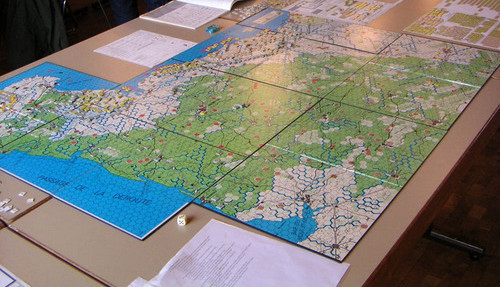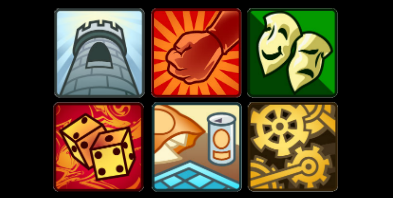Do you remember learning about ancient history? It was a time of war, invasion, and strife. Wave after wave of empires rose and fell. From the ashes of one great civilization came its successor, only to themselves be done in by collapsing borders or their own hubris. Rinse and repeat. Well, if you’re looking for a game that simulates that continual re-conquest but don’t care to know the actual historical details, you’re in luck!
The Premise
Small World is aptly named. Space is a limited resource in this fantasy realm, and players portray various races looking to expand their territory into each other’s. The more territory a player holds each round, the more points they get. Alas, each race will eventually over-extend or be conquered by its neighbor. Luckily though, players are able to discard their fallen nation, pick another race, and conquer again. And again. And again.
The Rules
Small World is a fantasy land in continual chaos, and it’s up to each player to come out on top in the end. It unfolds over a number of rounds contingent on number of players. The game contains 14 different races alongside 20 special powers that will aid you in dominating the globe. The races and powers are paired up randomly. The first six available options are laid out next to the game board at the start, but they will be replenished as they are chosen.
Much like the concept, the rules are straight-forward and fairly simple. For each player’s first turn, they will select one of the available race/power pairs. Each pair gives the player a specified number of units and, sometimes, additional materials, such as forts or tents. Then, the player picks an edge of the map and comes sweeping in from parts beyond, looting and pillaging as far into the countryside as they can go! Each space taken requires a commitment of two units, plus one more for every mountain, defense, or other unit that may unfortunately lie in the active player’s path. If the player doesn’t have enough pieces, they have one shot to roll a die calling in reinforcements. Otherwise, they have gone as far as they can this round. The player collects Victory coins for their territory (plus any bonuses granted by special powers). Then, it’s the next player’s turn to do the same.
On subsequent rounds, each player has the option of either continuing the rampage by picking up most (or all) of their remaining pieces and redistributing them violently across the countryside, or of abandoning their current race as a lost cause and going into decline. They’ll lose all special powers in doing so, but they will still receive points for their current spaces. The following turn they’ll have their pick of a brand new faction – with a brand new army.
Disposable Strategy

If you’d prefer a more battle-hardened game, try The Longest Day about the Normandy Invasion. It’s just slightly quicker than the actual invasion itself.
Photo by PenguinDust
The only real confusion that has come up while explaining the rules to new players involves combat losses. It’s not because it’s complicated – it’s just counter-intuitive: players cannot lose units while attacking, only while defending. This was clearly intentional, as it keeps the game moving forward at a fast pace while still encouraging combat. If there is no downside when playing aggressively, there is little incentive to hold back. In Small World, this is essential. The game purposely avoids the necessity to develop lengthy battlefield strategies. If players want that, there is an entire host of complex games they could look into. We suggest some European war games or a nice copy of Go.
The wonderful thing about Small World is that this lack of being beholden to any one strategy is part of the game’s charm. With all of the different possible mixtures in powers and races, why would you want to limit yourself to just one play style? Here, it’s ok to abandon one tactic and try out another. If the current race isn’t working anymore, it’s nice to be able to cast it aside for something shiny and new – and have that be a good thing.
The Entire Pantheon
There are not a lot of games that can satiate most gamer types – but that’s why there are so many games to choose from! However, Small World is among that small percentage of games that does exactly that. There is a special blend of planning, luck, and general chaos that becomes a fun experience for everyone. Small World lends itself to multiple age groups and can easily be for a family game night as much as a die-hard gamer convention.

Truly something for everyone
The rules are basic, partly because they work just fine as they exist and partly because the complexity of the game comes from the race and power combinations rather than cumbersome mechanics. These combos are rarely the same from one experience to the next, and Daredevils will relish having a free hand to experiment on a turn-by-turn basis. Even Socializers can get in on this since gameplay is simple and doesn’t require a ton of long-term thinking. And yet the aspect of dealing with enemies keeps players proactive. You don’t have to scheme to face your foes by any means, but a Tactician’s skill in looking forward won’t be wasted either.
Now, if the rules are simple, so is the objective: accumulate points to win. Not only does that put you in the path of other players, this targeting is sort of the intent. Strikers will have a field day with this game, as how they get to the finish line is entirely up to what they deem the most brutally efficient way forward – especially since heavy elements of chance won’t have many opportunities to derail their plans.
Players build up points while expanding their influence all over the map. Count your local Architect in for that alone. They may hedge on having to engage in combat to grow, but that hesitance will be at a minimum given how combat works in this game.
Immersionists could find fault with not having much time to world build, but the world is too small for that! (Sorry.) Still, the realm is flavorful and diverse enough to keep most entertained, be it through Flying Giants or Diplomatic Orcs. We dare you try to not role-play a Dragon Master Wizard just a little.
The Takeaway
Small Word comes up big. It’s a game that proves to be fun, engaging, chaotic, and light, all at the same time. There is something for just about everyone, and the playable combinations range from powerful to laughably absurd. No one should be disappointed adding this to their collection. If there is room, that is.
![]()
Cardboard Republic Snapshot Scoring (Based on scale of 5):
Artwork: 4
Rules Clarity: 5
Replay Value: 4.5
Physical Quality 4.5
Overall Score: 4.5
![]()

